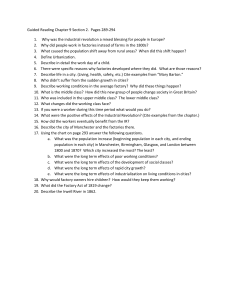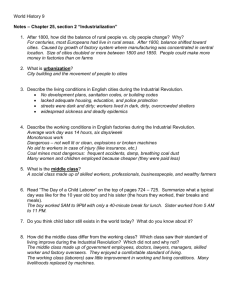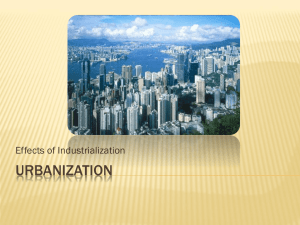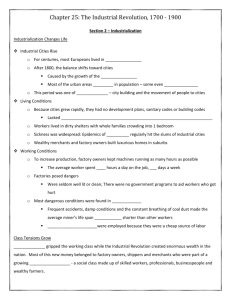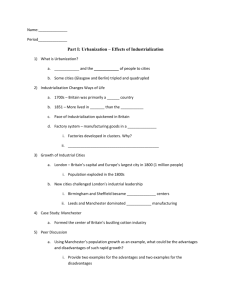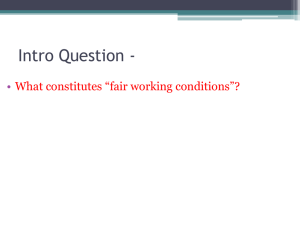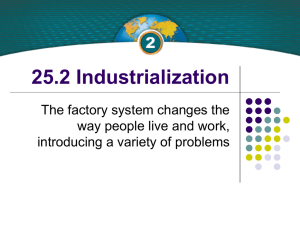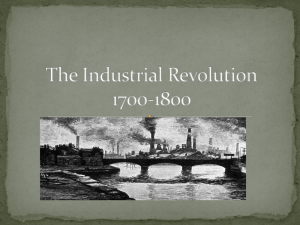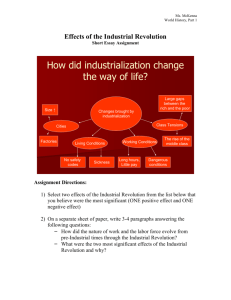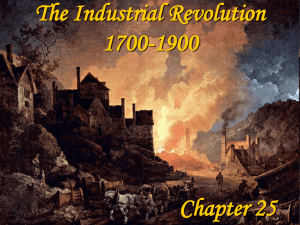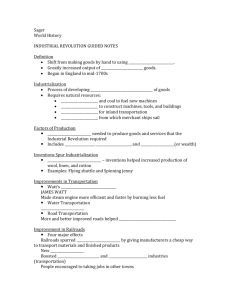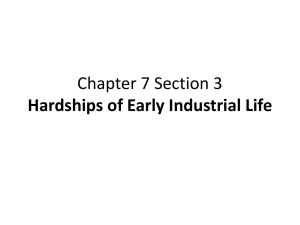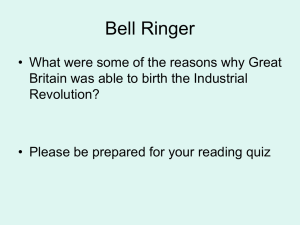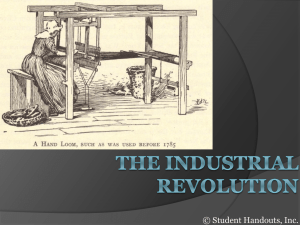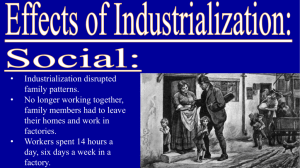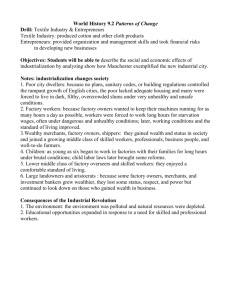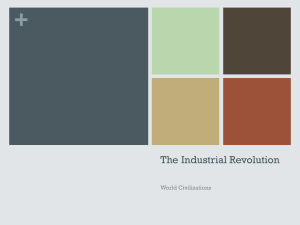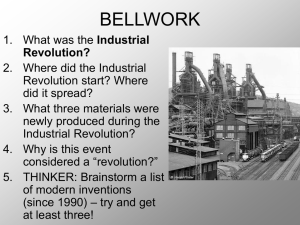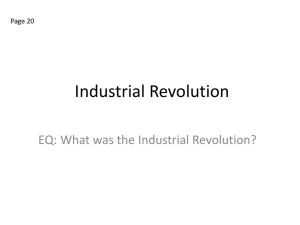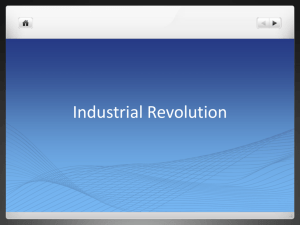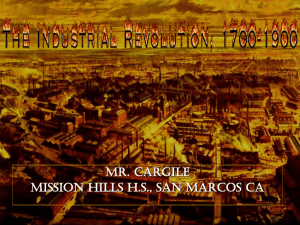Chapter 25 – Section 1 - Binghamton City Schools
advertisement
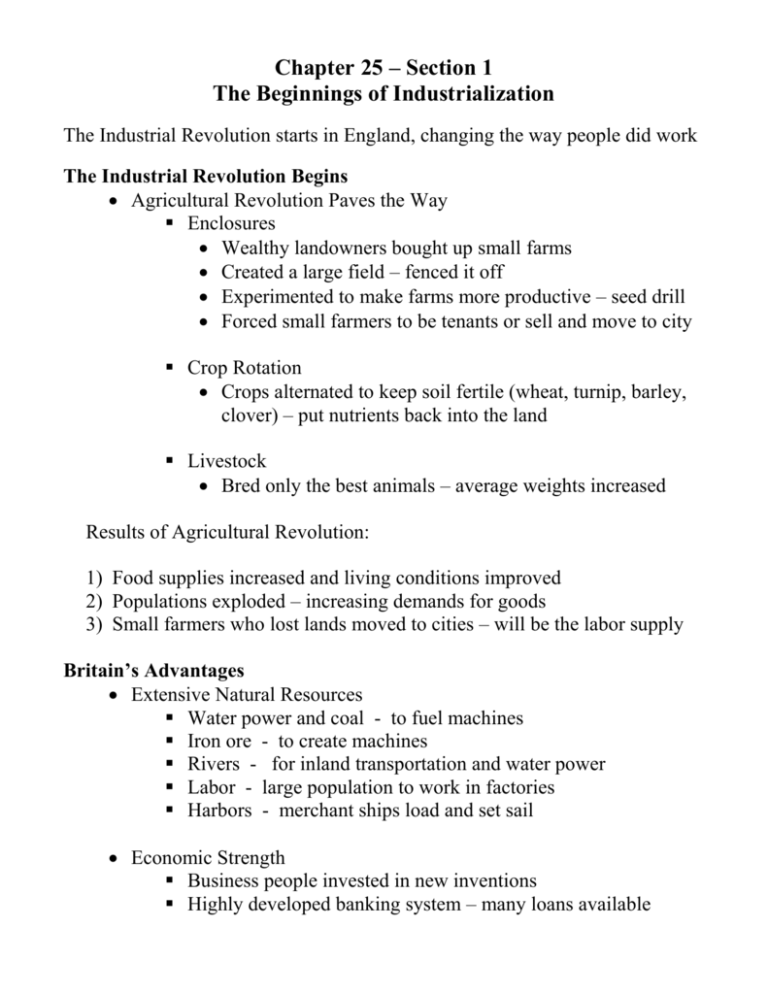
Chapter 25 – Section 1 The Beginnings of Industrialization The Industrial Revolution starts in England, changing the way people did work The Industrial Revolution Begins Agricultural Revolution Paves the Way Enclosures Wealthy landowners bought up small farms Created a large field – fenced it off Experimented to make farms more productive – seed drill Forced small farmers to be tenants or sell and move to city Crop Rotation Crops alternated to keep soil fertile (wheat, turnip, barley, clover) – put nutrients back into the land Livestock Bred only the best animals – average weights increased Results of Agricultural Revolution: 1) Food supplies increased and living conditions improved 2) Populations exploded – increasing demands for goods 3) Small farmers who lost lands moved to cities – will be the labor supply Britain’s Advantages Extensive Natural Resources Water power and coal - to fuel machines Iron ore - to create machines Rivers - for inland transportation and water power Labor - large population to work in factories Harbors - merchant ships load and set sail Economic Strength Business people invested in new inventions Highly developed banking system – many loans available Political Stability No wars taking place on British soil – no damage Military /political successes resulted in positive attitude Parliament passed laws to protect businesses Inventions Spur Technological Advances Textile industry was the first to be transformed Textiles Flying shuttle – doubled worker productivity Spinning Jenny – could spin 8 threads at once Power loom – sped up weaving Transportation Steam engine – James Watt made it an efficient power source Canals – cut cost of transporting goods Steamboat - fast Roads – macadam roads sped land transport Railroads Cheap way to transport goods – spurred industrial growth Boosted agriculture – food gets to distant markets faster Created jobs Railroad workers built the track Coal miners dug the coal for steam fuel Iron miners dug the iron for track Made travel easier – commute to work, visit country resorts Key Concepts: Agricultural Revolution leads to the Industrial Revolution Industrial Rev starts in Britain due to its geographic / social advantages Steam engine expands and improves transportation Chapter 25 – Section 2 Industrialization – Case Study: Manchester The factory system changed the way people lived and worked. Industrialization Changes Ways of Life Growth of Industrial Cities o Most European urban areas at least doubled in size o Factories developed in clusters near power sources o Industrial towns grew near natural resource pockets o People moved to cities for jobs – rapid growth Living Conditions o No building or sanitary codes regulated growth o Cities lacked proper services (police, fire, sewer, sanitation, schools) and adequate housing o Sickness was widespread – life expectancy was short Working Conditions o Long days – 14 hours a day, 6 days a week o Factories were dangerous (poor lighting, ventilation, heating, no safety features on machines), as were coal mines o No disability plans if you are injured – you lose your job Class Tensions o Industry created a new, growing middle class Some grew wealthier than traditional aristocratic landowners Landowners looked down on business people o Upper and lower middle classes emerge Upper – doctors, lawyers, gov’t workers, factory managers Lower – factory overseers, printers, skilled workers Lived comfortably o Workers still had poor standard of living Machines replaced them – Luddites destroyed machines Positive Effects o Created jobs and added wealth to the nation o Creates better standard of living Immediate for middle class, later for workers Better housing Cheaper clothing and products Healthier, cheaper food Technological innovation and inventions The Mills of Manchester Why is Manchester the perfect example of the “new industrial city”? Did Manchester’s business people deserve the wealth they obtained? Briefly list and describe two (2) negative aspects of Manchester’s factories. Key Concepts: Life is changed with the advent of the factory system Cities grow rapidly and unchecked during this period Living and working conditions are poor for labor New middle class emerges Despite negative aspects, the standard of living for all is eventually raised
